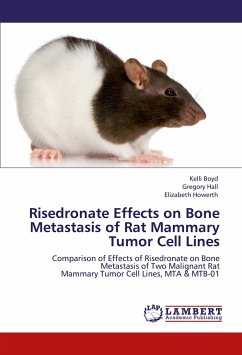When compared to MTA cells, MTB-01 cells were susceptible to risedronateinduced apoptosis, had decreased ability to bind to risedronate-treated bone, and did not produce MMP-2 or MMP-9 proteases. MTA cells were less susceptible to risedronateinduced apoptosis and produced MMP-2. Additionally, adhesion of MTA cells to bone matrix was not diminished by risedronate treatment. Our results suggest that the nonresponsive nature of the MTA cell line may be due to MMP-2 production (possibly allowing ongoing destruction of risedronate-treated bone), continued adhesion to risedronate-treated bone matrix, and decreased susceptibility to risedronate-induced apoptosis.
Hinweis: Dieser Artikel kann nur an eine deutsche Lieferadresse ausgeliefert werden.
Hinweis: Dieser Artikel kann nur an eine deutsche Lieferadresse ausgeliefert werden.








